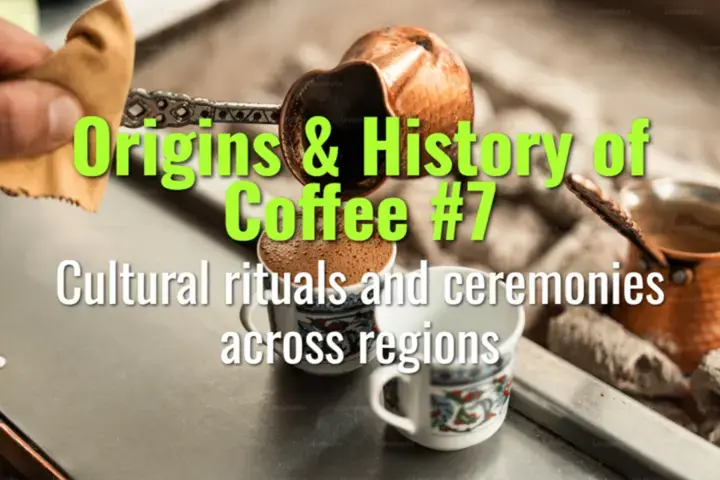Cultural rituals and ceremonies across regions
This topic explores the diverse cultural rituals and ceremonies that surround coffee in different parts of the world, showing how preparation, serving, and symbolism have turned coffee into more than just a beverage.
- Coffee Basics Nerds
- 2 min read
Article 7 of 9 in Origins & History of Coffee/

Ethiopia – The Origin Ritual
- Ethiopian Coffee Ceremony: A central part of hospitality. Green beans are washed, roasted over an open flame, ground by mortar and pestle, and brewed in a clay pot (jebena).
- Three rounds of coffee: Abol (first), Tona (second), Baraka (third). Each cup symbolizes deepening blessing and community.
- Social meaning: The ceremony can last hours, reinforcing family and neighborly bonds.
Middle East & Arabic Traditions
- Qahwa (Arabic Coffee): Often spiced with cardamom, saffron, or cloves, served in small handleless cups (finjan).
- Hospitality ritual: Guests are always served coffee first, accompanied by dates.
- Symbolism: Serving coffee is an act of generosity and respect; refusing it may be seen as impolite.
Turkey & the Balkans
- Turkish Coffee: Prepared in a small copper pot (cezve), finely ground coffee is simmered (not boiled) with sugar added during brewing.
- Social ritual: Drunk slowly, often with sweets. Cups are turned upside down for fortune-telling (tasseography) from coffee grounds.
- UNESCO recognition: Turkish coffee culture is listed as Intangible Cultural Heritage.
Italy & Espresso Culture
- Espresso Ritual: Italians drink espresso quickly al banco (at the bar). It represents efficiency, community, and a daily pause.
- Cultural rules: Cappuccino is traditionally consumed only in the morning. Espresso is a symbol of modern Italian identity.
Japan
- Kissaten Cafés: Traditional coffee houses that mix Western brewing with Japanese aesthetics. Often spaces for quiet reflection and art appreciation.
- Modern innovations: Japan helped popularize canned coffee (1960s) and today is a hub for precision brewing and siphon coffee.
Latin America
- Colombia: Coffee is tied to national identity; small farms often host visitors with ceremonial tastings to showcase their harvest.
- Brazil: The cafezinho is a small, sweetened coffee offered to every guest, embodying warmth and welcome.
Africa Beyond Ethiopia
- Sudan & Eritrea: Coffee often served with ginger, cloves, or cinnamon, reflecting local spice traditions.
- Social emphasis: Coffee gatherings are communal and often accompanied by incense burning.
Summary
Across the world, coffee rituals express hospitality, identity, and social connection. From Ethiopia’s hours-long ceremonies to Italy’s two-minute espresso, each tradition highlights how coffee adapts to local culture while binding people together.